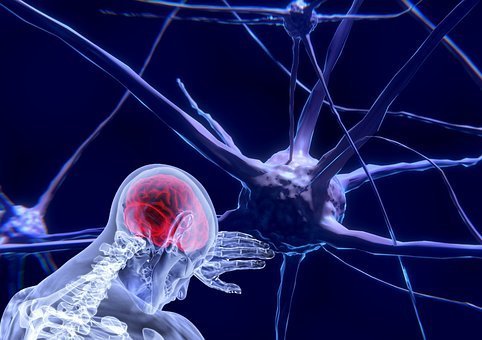MUST READ! COVID-19 Effects: Study Says That COVID-19 Could Lead To Increase In Parkinson’s Disease Among Those Infected
Source: COVID-19 Effects May 13, 2020 5 years, 8 months, 3 weeks, 3 days, 22 hours, 11 minutes ago
COVID-19 Effects: Brazilian medical researchers conclude in a new medical study that COVID-19 might lead to an increase Parkinson’s disease among those that were infected. Their study findings published in the
Journal of Parkinson's Disease (JPD), discuss several manners through which the COVID-19 pandemic might contribute to the expected exponential growth of Parkinson’s disease in the coming years, compounding the economic and societal impacts of the disease.
https://content.iospress.com/articles/journal-of-parkinsons-disease/jpd202073

Although the potential long-term neurological manifestations of COVID-19 infection are unknown, clinical symptoms like the loss of smell and taste and encephalitis indicate that the SARS-CoV-2 coronavirus might have the ability to invade the central nervous system.
Senior author Dr Carla Alessandra Scorza, from the Department of Neurology and Neurosurgery, Federal University of São Paulo/Paulista Medical School told Thailand Medical News, "The interesting aspect of the olfactory pathway hypothesis for SARS-CoV-2 neuroinvasion is the potential presence of the coronavirus in the brainstem, which contains the respiratory nuclei responsible for breathing rhythm.”
Dr Scorza cites studies that found patients with the severe form of COVID-19 infection were more likely to develop acute cerebrovascular disease, as well as studies that found evidence of encephalopathy and intracerebral hemorrhage on brain scans of patients with the infection.
Past evidence of a potential link between viruses and Parkinson’s disease stems from an epidemic of encephalitis lethargica following the 1918 influenza outbreak. Dr. Scorza notes that while the evidence linking that influenza outbreak to PD pathogenesis was correlational, it led to further investigations. Some of the primary motor symptoms and histological features of Parkinson’s disease have been associated with the H1N1 influenza virus and other viruses such as Coxsackie virus, West Nile virus, Japanese encephalitis B, and HIV.
Although the researchers acknowledge that further research is needed to understand the role of viruses in the pathogenesis of Parkinson’s disease, they believe the study findings suggest that both neurotropic and non-neurotropic viruses may contribute to the initiation of Parkinson’s disease, either directly by the physical presence of the virus in the central nervous system, or indirectly, by inducing a long-lasting inflammatory process in the brain.
Please help support this website by kindly making a donation to sustain this website and also all in all our initiatives to propel further research:
https://www.thailandmedical.news/p/sponsorship
Furthermore since many studies confirm that SARS-CoV-2 may induce the severe immune reaction known as a cytokine storm and hyper inflammation in patients with severe COVID-19
infection, is it possible, the researchers hypothesize, that the infection could be a triggering event of the neurodegenerative cascade underlying Parkinson’s disease?
Also, past studies found that other human coronaviruses may remain latent in blood cells and thus, could induce central nervous system infections later.
Although clinical signs of Parkinsonism and Parkinson’s disease have not been associated with previous coronavirus outbreaks, coronavirus antibodies have been detected in cerebrospinal fluid samples in persons with Parkinson’s disease.
The medical researchers also speculate whether COVID-19 survivors may represent a disproportionately large fraction of the future Parkinson’s disease patient population, leading to greater societal impacts. Although the evidence is still inconclusive, persons who were born or were young at the time of the 1918 influenza outbreak had a two- to three-fold higher risk of developing Parkinson’s disease than those born prior to1888 or after 1924.
"Although it is obviously too early to know what the long term consequences of COVID-19 will be on the brain, the clinical psychiatry and neurology research communities definitely need to be vigilant in monitoring how those who recover from moderate and severe COVID-19 fare in the future. Depressive disorders are undoubtedly associated with inflammation, and for Parkinson’s disease there is mounting evidence that both inflammation and infections are associated with elevated risk for Parkinson’s disease later in life. Furthermore, published studies on experimental animals indicate that other RNA viruses are linked to marked elevations in alpha-synuclein in the brain, adding further concern regarding what the long term effects of SARS-CoV-2 might be on the brai,." explained JPD Co-Editor-in-Chief Patrik Brundin, MD, Ph.D., of the Van Andel Institute in the US.
Since Parkinson’s disease is already the fastest growing neurological disorder, sustained by a continuously aging population, Dr Daniella Balduino Victorino, the lead author of the study warns, "As other global pandemics in the past, the COVID-19 pandemic will likely last for a limited amount of time. Yet, it is about time we recognize that the pandemic of Parkinson’s disease is not going away anytime soon. All the cutting-edge science seeking viable vaccines and therapies against SARS-CoV-2/COVID-19 infection has only been made possible thanks to a tremendous amount of early scientific endeavors. Last year, while the NIH allocated more than U$6 billion on infectious diseases research, less than US$300 million was spent on Parkinson’s disease research. Parkinson’s disease breakthroughs heavily depend on devoting more resources to advancing this field of research."
There are also other studies currently underway to ascertain the effects of the SARS-CoV-2 on ‘recovered’ patients and the potential long term health hazards or medical conditions that it could cause.
For more on potential
COVID-19 Effects on individuals and their long term health, keep logging to Thailand Medical News.
Please help support this website by kindly making a donation to sustain this website and also all in all our initiatives to propel further research:
https://www.thailandmedical.news/p/sponsorship
